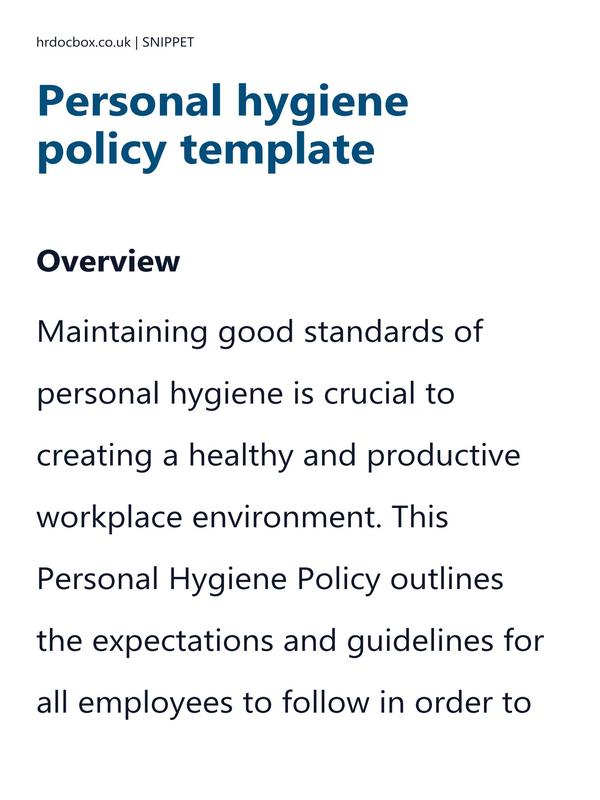Wellbeing policy templates
If you need policies to communicate your company rules and support regarding wellbeing initiatives, these policy templates provide an effective legal framework.
- 9 Wellbeing templates.
- Includes all Wellbeing templates, plus 12 months' access with all updates to the Wellbeing policy templates provided free of charge and notified to you.
- UK-specific accuracy.
- Instantly download templates as Word / PDF / plain text, or send by email.
- The Wellbeing policy templates will SAVE you up to 6 hours drafting & research. Save cost. Reduce risk.
Wellbeing
Fostering employee wellbeing is good for people and the organisation.
Promoting wellbeing can help prevent stress and create positive working environments where individuals and organisations can thrive.
Good health and wellbeing can be a core enabler of employee engagement and organisational performance.
The COVID-19 pandemic has also pushed employee health and wellbeing to the top of the business agenda over the past few years.
Wellbeing templates are essential for clearly defining company policies and setting consistent employee expectations around Wellbeing arrangements.
Compliance
Compliance
Here are some key UK employment legislation considerations to keep in mind when implementing wellbeing policies:
- The Health and Safety at Work Act 1974: This legislation places a duty on employers to ensure the health, safety, and welfare of their employees. Wellbeing policies must be implemented in compliance with this legislation and ensure that the physical and mental health of employees is protected.
- The Equality Act 2010: This legislation prohibits discrimination on the basis of protected characteristics such as age, disability, gender reassignment, marriage and civil partnership, pregnancy and maternity, race, religion or belief, sex, and sexual orientation. Wellbeing policies must ensure that all employees are treated fairly and that there is no discrimination on the basis of any protected characteristic.
- The Working Time Regulations 1998: This legislation sets out the maximum number of hours that employees can work each week and provides for rest breaks and annual leave. Wellbeing policies must ensure that employees are not overworked and that they are provided with sufficient rest breaks and annual leave.
- The Mental Health Act 1983: This legislation provides for the care and treatment of people with mental health conditions. Wellbeing policies must ensure that employees with mental health conditions are supported and that reasonable adjustments are made to the workplace to accommodate their needs.
- The Disability Discrimination Act 1995: This legislation makes it illegal for employers to discriminate against employees with disabilities. Wellbeing policies must ensure that employees with disabilities are provided with reasonable adjustments to support their needs.
- The GDPR and the Data Protection Act 2018: These regulations set out requirements for data protection and privacy. Wellbeing policies must ensure that all employee data is handled securely and with respect for their privacy rights.
Frequently Asked Questions about Wellbeing templates
Frequently Asked Questions about Wellbeing templates
-
Can small businesses use these Wellbeing policy templates?
Yes. The Wellbeing policy templates are designed to be flexible and suitable for organisations of all sizes, including small businesses and charities. They follow UK employment law best practice, so even if you don't have an in-house HR team, you can confidently manage Wellbeing processes and issues.
-
Are these Wellbeing policy templates up to date for UK law in 2026?
Absolutely. All templates are drafted with the latest ACAS guidance and UK employment legislation in mind. We review and update them regularly, so you can be confident they remain compliant.
-
What types of Wellbeing policies are included?
Every toolkit includes a complete set of editable policy templates, designed to save time and ensure compliance.
-
How will this help me as an HR manager or business owner?
Purchasing the policies saves you hours of drafting time and reduces the risk of legal mistakes. Instead of starting from scratch, you'll have clear, professional policy templates that you can adapt to your business.
-
Do I get instant access to the policy templates?
Yes. Once purchased, you'll be able to download the Wellbeing policies instantly. The templates are provided in editable Word or Excel format so you can customise them easily, and PDF format for easy sharing.
-
Can I preview a sample Wellbeing template before buying?
We provide free examples of our templates here. This gives you a sense of the quality and layout before you commit to purchasing the full toolkit.
-
What if I need a full HR toolkit, not just Wellbeing templates?
If you're looking for broader support, we also offer library bundles that include Wellbeing templates along with absence, grievance, and other HR policies. These may be more cost-effective if you need a complete HR library.
-
Why should I use these templates, and not AI to generate them?
The risk of using free AI-generated templates 'without review' includes your legal exposure, missing context, and no awareness of the wider process. Purchasing from us mitigates that risk.



